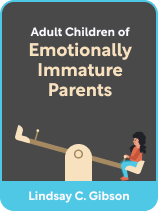

This article is an excerpt from the Shortform book guide to "Adult Children of Emotionally Immature Parents" by Lindsay C. Gibson. Shortform has the world's best summaries and analyses of books you should be reading.
Like this article? Sign up for a free trial here.
Are you trying to heal from emotionally immature parents? How can you mend your childhood wounds in adulthood?
Many adults who suffered from childhood emotional neglect still suffer from this trauma. In Adult Children of Emotionally Immature Parents, Lindsey Gibson talks about how you can heal these wounds in just three ways.
Learn how to heal from emotionally immature parents to move forward in life.
1. Connect With Your Authentic Self and True Feelings
Gibson says the first step toward learning how to heal from emotionally immature parents is connecting with your authentic self, which emotionally neglectful parents prevent by denying their children the ability to express a full range of emotions.
Your authentic self is your truest guide to genuine connections with others, because when you honor who you truly are, you exist in your state of greatest potential—focused on possibility, not problems.
Gibson recommends that you begin reconnecting with your authentic self and true feelings by doing two exercises:
- Make a “real me” and “not real me” list
- Acknowledge your true feelings
2. Redefine Your Relationship With Your Emotionally Immature Parent
We just discussed how to connect with your authentic self and feelings. Now we’ll explore ways to reframe your relationship with your emotionally immature parent so you can honor your authentic self and improve your interactions with them.
See Your Parent Objectively
Gibson argues that to move forward in a healthier way with your parent, you must first see them objectively. This can be challenging because you may desperately want your parent to change, but the unfortunate reality is that most emotionally immature parents lack the tools necessary to have healthy, emotionally connected relationships with their children.
Coming to grips with this realization, though painful, enables you to interact with your parent based on the reality of who they are rather than who you wish them to be—better preparing you to manage their limitations when you interact with them.
Reframe your Relationship
Gibson says that once you understand that your emotionally immature parent likely won’t change, your goal must shift from trying to forge an emotional connection with them, to finding ways to interact with them that aren’t emotionally damaging. Three strategies can help you manage and create emotional distance from your parent each time you engage with them:
Strategy 1: Enter each interaction with a clear goal. Setting a goal from the outset helps you take control of the interaction and redefine boundaries with your parent. For example, your goal might be to tell your parent that you can only talk on the phone for five minutes because you’re busy, or that you’ll only spend one night with them over the holidays instead of two.
Strategy 2: Focus on speaking your piece clearly and unemotionally. Expressing what you want rather than focusing on your parent’s reaction to you helps honor your authentic needs and feelings. This makes you less likely to be disappointed in their behavior and a step closer to building healthy relationships with others.
Strategy 3: Observe and manage each interaction like an outsider looking in. Observing your interaction with your parent from an emotionally detached place will make you feel less like a powerless participant trapped in an unhealthy relationship. For example, think of yourself as a researcher studying a subject. Silently note, in your head, how your parent’s tone of voice changes, how long they talk to you, and how you’d describe what they say to another person.
Potential Outcomes of Your Efforts
Gibson says that in some cases, creating new boundaries with your emotionally underdeveloped parent can relax them and decrease the toxicity of your interactions. This is because when you accept their limitations and they don’t feel that you’re asking them to change, they may be less emotionally triggered and reactive. In most cases, however, your parents will show displeasure or protest. If your parent is unhappy with your attempts to heal and move forward in a healthier way, remind yourself that your actions are legitimate and necessary.
Gibson says that at this point, you may decide that your parent does more damage than good in your life. If you conclude that you don’t want to regularly spend time with your parent, you can pull back from or discontinue contact with them completely. This can be a challenging decision, but taking an extended or permanent break from your parent can give you space to heal, connect more deeply with your authentic self, and move forward in a healthier way.
3. Identify and Develop Connections with Emotionally Healthy People
Now that you have the emotional tools to redefine your view of and relationship with your parents, we’ll discuss how to identify and build relationships with emotionally healthy people to heal from emotionally immature parents.
Gibson says that adult children of emotionally underdeveloped parents often end up in a cyclical pattern of relationship dysfunction because they gravitate to people whose behavior replicates the emotionally unhealthy family dynamics they grew up with. To break out of this cycle, you have to make conscious decisions about incorporating emotionally healthy people into your life.
Gibson says that emotionally healthy people share two common characteristics:
- They’re invested in your well being. They care about, respect, and validate your feelings, individuality, and boundaries, and look out for your best interests.
- Their behavior reflects a high level of emotional intelligence. They’re reliable, consistent, and truthful; they’re self-reflective and interested in growth and change; they acknowledge and address problems directly and can apologize when wrong.
The more of these qualities a person has, the more likely they’re capable of forming healthy emotional connections with others.
Gibson says that bringing emotionally connected people into your world isn’t a one-way street: equally as important is engaging with them in emotionally healthy ways. To do this, always strive to be your authentic self, clearly communicate your true needs, interests and desires, ask for help when you need it, and stay connected with people who support and validate you.

———End of Preview———
Like what you just read? Read the rest of the world's best book summary and analysis of Lindsay C. Gibson's "Adult Children of Emotionally Immature Parents" at Shortform.
Here's what you'll find in our full Adult Children of Emotionally Immature Parents summary:
- A look at the damage that emotionally neglectful parents can do to their children
- Strategies to help adults turn their relationship with their parent from toxic to tolerable
- Ways to heal and move forward from childhood emotional neglect






